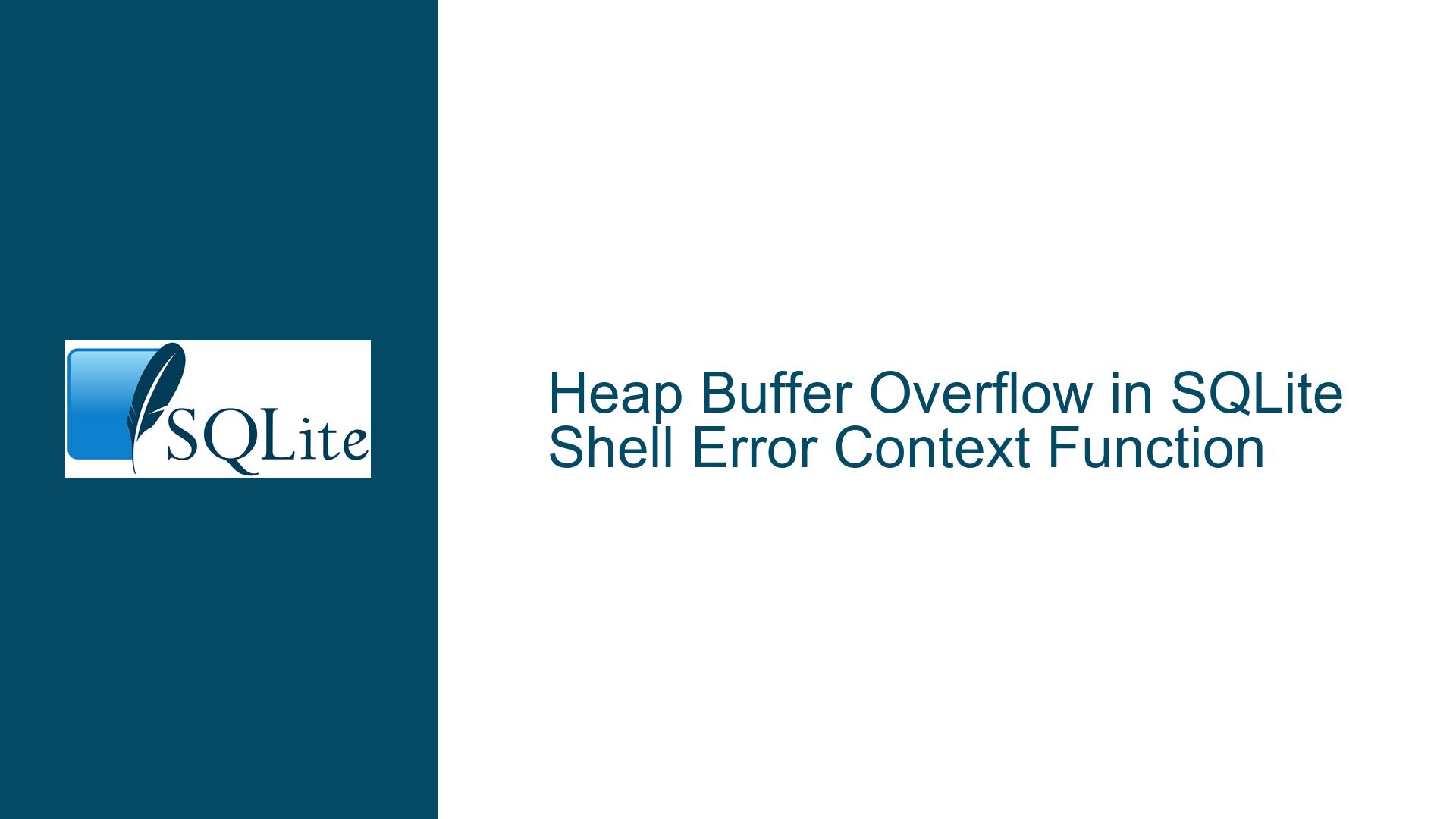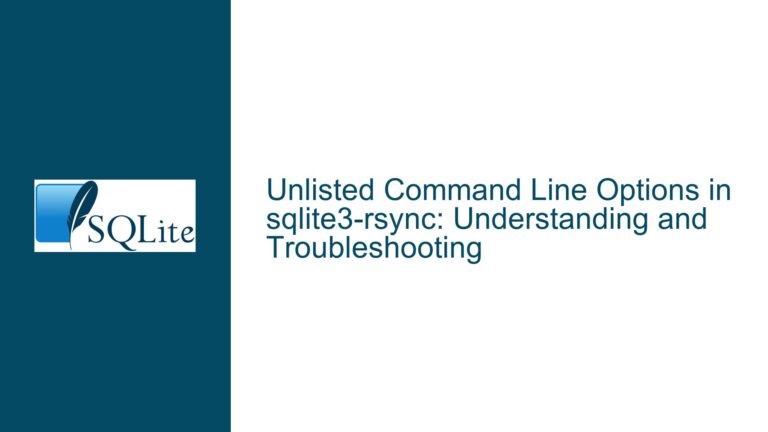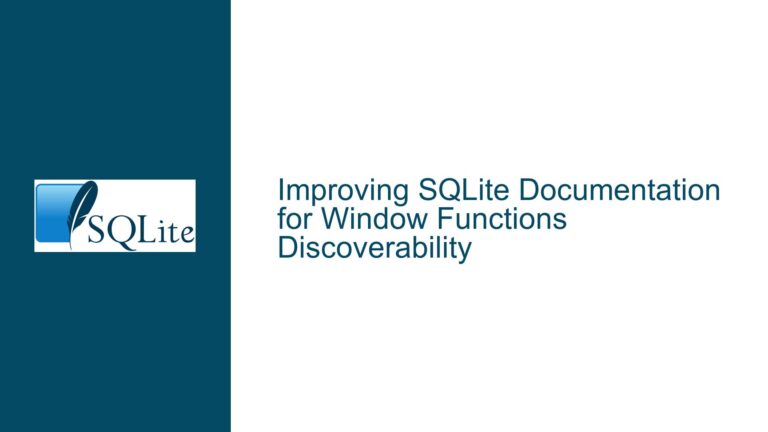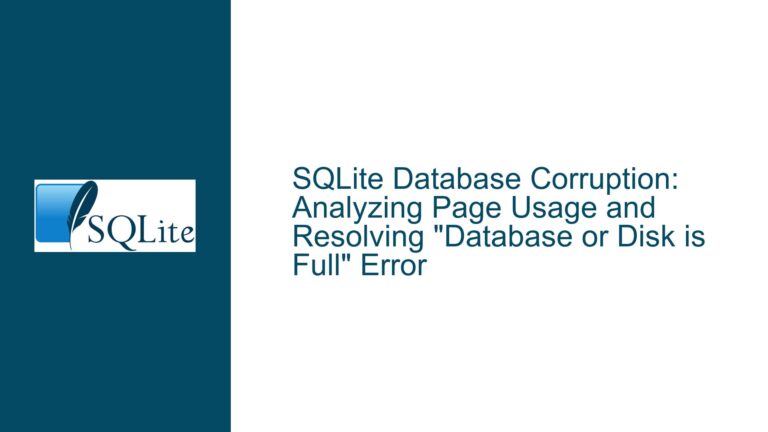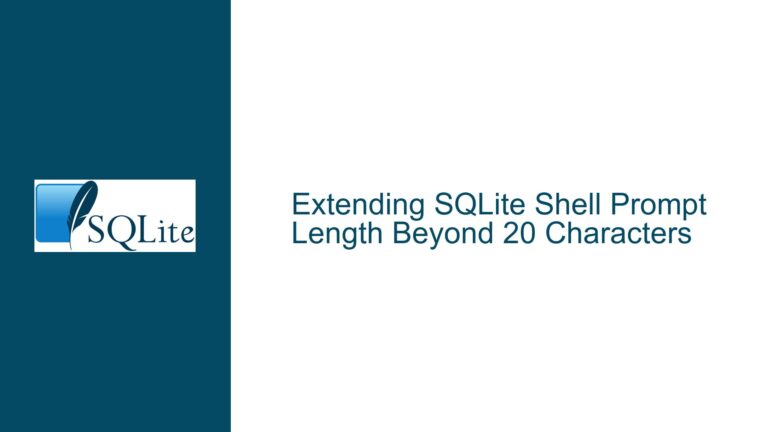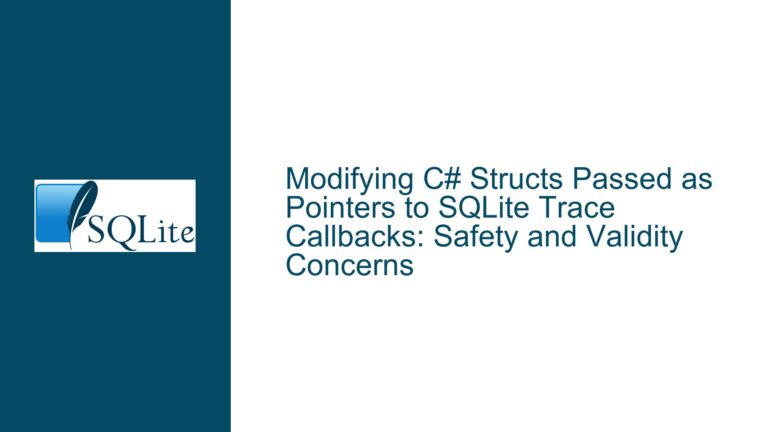Heap Buffer Overflow in SQLite Shell Error Context Function
Heap Buffer Overflow in shell_error_context Function
Issue Overview
The core issue revolves around a heap buffer overflow occurring in the shell_error_context function within the SQLite shell. This overflow is triggered when executing a proof-of-concept (PoC) file that was generated through fuzzing. The PoC contains special characters, making it non-human-readable, and it has been uploaded to a Google Drive for further inspection. The MD5 digest of the PoC is 1e9158e42f66103f42dd6df738f96327, ensuring its integrity for those who wish to replicate the issue.
The AddressSanitizer (ASAN) report indicates that the overflow happens when reading one byte to the left of a 213-byte region allocated in memory. The specific memory address where the overflow occurs is 0x6110000011bf, which is just outside the bounds of the allocated region [0x6110000011c0, 0x611000001295). The ASAN report also provides a detailed stack trace, showing the sequence of function calls leading up to the overflow. The primary functions involved are shell_error_context, save_err_msg, shell_exec, runOneSqlLine, process_input, and main.
The compilation flags used during the build process include enabling AddressSanitizer (-fsanitize=address), debugging symbols (-g), and various SQLite-specific debugging and optimization options such as SQLITE_DEBUG, SQLITE_ENABLE_TREETRACE, SQLITE_ENABLE_WHERETRACE, SQLITE_ENABLE_CURSOR_HINTS, SQLITE_COUNTOFVIEW_OPTIMIZATION, and SQLITE_ENABLE_STAT4. These flags are crucial for diagnosing the issue, as they provide additional context and tracing capabilities that help pinpoint the exact location and cause of the overflow.
The bisecting results reveal that the issue was introduced between two specific commits: 416602a85101c2cd (BAD) and 155c3e9c7ccd6fd6 (GOOD). This narrows down the potential changes in the codebase that could have led to the heap buffer overflow. The BAD commit (416602a85101c2cd) was made on 2021-12-29 04:13:37, while the GOOD commit (155c3e9c7ccd6fd6) was made just a few minutes earlier at 2021-12-29 04:10:49. This tight timeframe suggests that the issue was introduced by a specific change in the codebase during this period.
Possible Causes
The heap buffer overflow in the shell_error_context function can be attributed to several potential causes, each of which needs to be carefully examined to determine the root cause of the issue.
One possible cause is an off-by-one error in the memory allocation or manipulation within the shell_error_context function. This type of error occurs when a program accesses memory just outside the bounds of an allocated buffer, often due to incorrect loop conditions or pointer arithmetic. In this case, the ASAN report indicates that the overflow occurs when reading one byte to the left of the allocated region, which strongly suggests an off-by-one error.
Another potential cause is improper handling of special characters or malformed input in the PoC file. Since the PoC was generated through fuzzing, it likely contains a combination of valid and invalid SQL commands, as well as special characters that could trigger unexpected behavior in the SQLite shell. If the shell_error_context function does not properly sanitize or handle these special characters, it could lead to memory corruption and buffer overflows.
A third possible cause is a race condition or concurrency issue, although this is less likely given the single-threaded nature of the SQLite shell. However, if the shell is being used in a multi-threaded environment or if there are any asynchronous operations being performed, it could lead to memory corruption and buffer overflows.
Finally, the issue could be related to a bug in the memory allocation or deallocation logic within the SQLite shell. The ASAN report indicates that the memory region was allocated by the process_input function using realloc, which suggests that the issue could be related to dynamic memory management. If there is a bug in the way memory is allocated, reallocated, or freed, it could lead to buffer overflows or other memory-related issues.
Troubleshooting Steps, Solutions & Fixes
To troubleshoot and resolve the heap buffer overflow in the shell_error_context function, the following steps should be taken:
Step 1: Review the Code Changes Between the BAD and GOOD Commits
The first step is to review the code changes between the BAD commit (416602a85101c2cd) and the GOOD commit (155c3e9c7ccd6fd6). This will help identify the specific changes that introduced the heap buffer overflow. The goal is to pinpoint the exact lines of code that were modified and determine how these changes could have led to the issue.
Step 2: Analyze the shell_error_context Function
Next, carefully analyze the shell_error_context function to identify any potential off-by-one errors or improper handling of special characters. Pay close attention to any loops, pointer arithmetic, or memory manipulation operations that could lead to buffer overflows. Additionally, review the function’s logic to ensure that it properly handles all possible input scenarios, including malformed or unexpected input.
Step 3: Reproduce the Issue with the PoC File
Reproduce the issue using the provided PoC file. This will help confirm that the issue is indeed related to the specific input and not a result of other environmental factors. Use the same compilation flags and ASAN options to ensure that the issue can be consistently reproduced. Once the issue is reproduced, use debugging tools such as GDB or LLDB to step through the code and observe the behavior of the shell_error_context function.
Step 4: Implement Fixes and Test
Based on the analysis, implement fixes to address the identified issues. This may involve correcting off-by-one errors, improving input handling, or fixing memory allocation logic. After implementing the fixes, recompile the SQLite shell with the same compilation flags and test the PoC file again to ensure that the issue has been resolved. Additionally, run a comprehensive set of regression tests to ensure that the fixes do not introduce new issues.
Step 5: Submit the Fixes to the SQLite Development Team
Once the issue has been resolved, submit the fixes to the SQLite development team for review and inclusion in future releases. Provide a detailed explanation of the issue, the steps taken to diagnose and fix it, and any relevant test cases or PoC files. This will help ensure that the issue is properly addressed and that the fixes are thoroughly reviewed by the SQLite development team.
Step 6: Monitor for Similar Issues
Finally, monitor for any similar issues that may arise in the future. Heap buffer overflows can be difficult to detect and may manifest in different ways depending on the input and environment. By staying vigilant and proactively addressing potential issues, you can help ensure the stability and security of the SQLite shell.
In conclusion, the heap buffer overflow in the shell_error_context function is a critical issue that requires careful analysis and thorough testing to resolve. By following the troubleshooting steps outlined above, you can identify the root cause of the issue, implement effective fixes, and contribute to the ongoing improvement of the SQLite shell.
